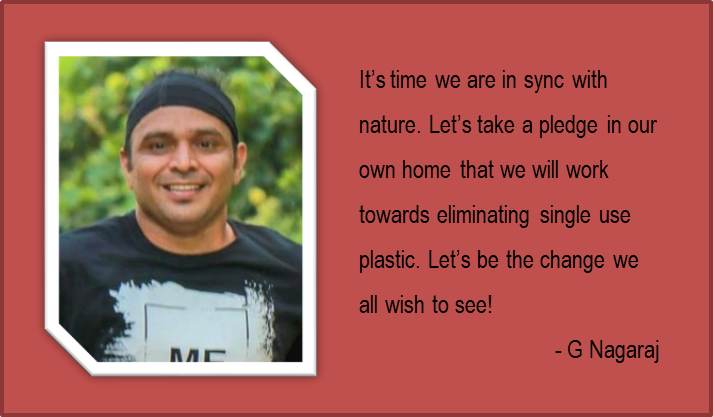G Nagaraj, Indian Plogman a.k.a Cupman is a human catalyst who has been on a journey promoting sustainability across India. He speaks to Sameera Fernandes on the need for all of us to step up and make a difference in our own way.
Sustainable Communities are gaining prominence everywhere. What are some of the key areas of focus and a culture that we should work on building?
Whenever we embark on any initiative, promoting a culture of inclusivity can do wonders. The key to success is all about collaboration and partnerships. When the public is involved, it is easier to garner momentum and accelerate the project at a faster pace.
Inclusivity does wonders. Whenever we take up a sustainable initiative, if it is driven by the public then we can expect a faster pace of engagement. This will also set stage for like-minded people to come together and work towards a higher purpose. My aim is life is to promote peaceful coexistence with all living creatures and to achieve this we all need to adopt a sustainable lifestyle.
You have spearheaded initiatives which have brought about tremendous impact in society. Do share your plans on making India a plastic free nation.
We want to catalyse action against the use of plastic bags through plogging. Our aim is to work towards transforming India into a plastic free nation in two decades from now. The only way we can do this is by drastically reducing plastic consumption and compel ourselves towards a healthier way of managing trash. My dream is that whenever we plog, we should not be in a position to spot trash. For this to happen, we need immense determination, planning and commitment. And to realise this dream, we need everyone to work together – corporates, public, the government and the entire community to think on similar lines.
You are also known as India’s Cupman in Industry circles. What initiatives are you pursuing towards this cause?
We need to constantly encourage women to choose sustainable options when it comes to health and hygiene. For the past two years, I noticed that women from under privileged sections of society are being offered food and clothes during the lockdown. It’s time we also offer sustainable products when it comes to menstrual hygiene through recyclable cups and pads. We have reached out to over 1500 corporates to promote this initiative and will continue to encourage women to use environmentally friendly options.
How important is recycling in today’s times? Is there an avenue that the community can participate in to accelerate this call to action?
We have a platform where various items such as clothes, shoes, toys, stationary, books, mobile phones and gadgets are collected, refurbished and then handed over to the less fortunate. The shoe bank ‘Sole Warriors’ that was initiated by a 13-year-old girl gathered high momentum where over 15,000 shoes were distributed to 10 slums across Bengaluru.
Within a span of 6 months, we also distributed over 50 mobile phones and laptops after refurbishing them. There are so many around us who may not be able to afford phones or gadgets and a sense of satisfaction prevails when we get to see how well these donated items are being re-used.
The concept of cutlery bank seems phenomenal. However, it does not have many takers. What seems to be the cause of concern?
We need to be aware that single use disposables such as paper cups, plastic spoons form a majority of the garbage which goes directly to the landfill. The cutlery bank, ensures people start thinking about eco-friendly celebrations. There are so many NGO’s across the city who rent out plates, tumblers, spoons and bowls, all of which are sanitised with a home-made citrus peel bio-enzyme which are offered either free or at a very nominal charge for the community. Awareness and education is still an issue and we need more people to promote this.
What is the reason behind your inspiration?
It was a common man who ignited the change in me. Around 8 years ago, I saw a group of people cleaning up the walls of the Winsdor Manor bridge. The concept of the more we clean, the cleaner it remains drives me passionately. A clean home is a sign of a good life and that’s what intrigues me. The birth of my daughter Avni (in sanskrit – earth) in 2012 reinforced my commitment towards Mother Nature.
What can responsible citizens do to make our world a better place?
All we need to do is look around us. If we can avoid 10 percent of the waste from going into the dustbin or the garbage bin, that itself will help us on our journey towards sustainability. The moment plastic is mixed with food waste it cannot be recycled.
It’s time we are in sync with nature. A simple modest lifestyle, not wasting a thing, extending the usable life of an item in an imaginative way etc. can all make the difference. Let’s take a pledge in our own home that we will work towards eliminating single use plastic. Let’s be the change we all wish to see!
The views and opinions published here belong to the interviewer and the interviewee and do not necessarily reflect the views and opinions of the publisher.



Be the first to comment on "Straight Talk with G Nagaraj"